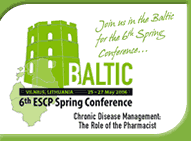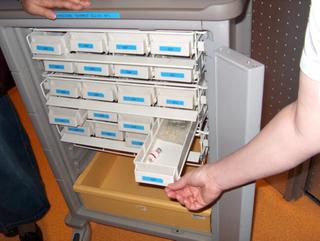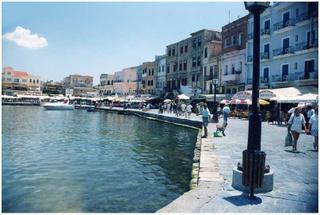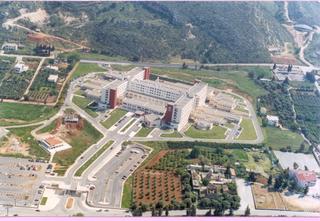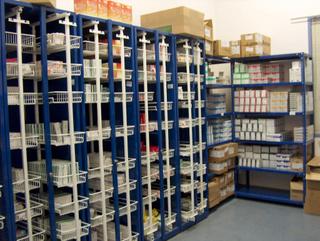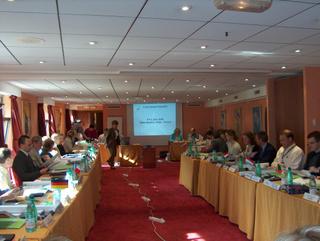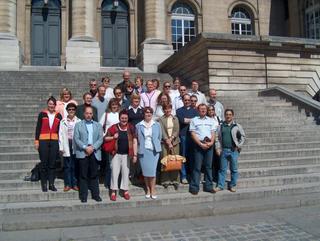My favourite journal is the
EJHP - European Journal of Hospital Pharmacy http://www.eahponline.com/asp/ejhp.asp?m=4.
This journal is published by the
EAHP -European Association of Hospital Pharmacists (
http://www.eahponline.org).
In each issue there is a special article/s under the name “
Country Focus” and these are the articles I read first of all. Many times I have to remember what is happening in various European countries in a specific area of Hospital Pharmacy and I have to find the corresponding issue of the journal. So, I decided to gather all the links from the journal, concerning my favourite articles from the “Country Focus” and now I can read my article directly from the website of the journal.
And here they are, the links for the following countries (according the date of their appearance in the "country focus" section of the EJHP:
FRANCE, NORWAY, ITALY, HUNGARY, NETHERLANDS, SWISS, SWEDEN, GERMANY, SPAIN, SLOVENIA, DENMARK, BELGIUM, AUSTRIA, UNITED KINGDOM, SLOVAKIA, PORTUGAL, FINLAND
FRANCECountry Focus France
Year: 2002; Nr: 1; Category: Others;
http://www.eahponline.org/upload/ejhp/p42+43.pdfCountry Focus France
Year: 2002; Nr: 1; Category: Others;
http://www.eahponline.org/upload/ejhp/p35-40.pdfNORWAYCountry Focus Norway
Year: 2002; Nr: 2; Category: Others;
http://www.eahponline.org/upload/ejhp/43to49.pdfITALYSIFO, the Italian national association representing the interests of hospital pharmacy and pharmaceutical services
Year: 2003; Nr: 1; Category: Others; Author: Samy Bouayad;
http://www.eahponline.org/upload/ejhp/p40-41.pdfThe Italian health system: origins and perspectives
Year: 2003; Nr: 1; Category: Others; Author: Samy Bouayad;
http://www.eahponline.org/upload/ejhp/p37-38.pdfCaught between regionalisation and cost containment Where do the cost/effectiveness boundaries lie for the Servizio Sanitario Nazionale?
Year: 2003; Nr: 1; Category: Others; Author: Samy Bouayad;
http://www.eahponline.org/upload/ejhp/p44a48.pdfEuropean Association of Hospital Pharmacists Annual Congress 2003, 26 – 28 February, Florence, Italy
Year: 2003; Nr: 1; Category: Others; Author: Arnold G. Vulto;
http://www.eahponline.org/upload/ejhp/p50-51(1).pdfFlorence, a city of history and elegance
Year: 2003; Nr: 1; Category: Others; Author: Samy Bouayad;
http://www.eahponline.org/upload/ejhp/p52a54.pdf
HUNGARYHungarian country focus
Year: 2003; Nr: 2; Category: Others; Author: Thomas Friedrich;
http://www.eahponline.org/upload/ejhp/p32a35.pdf
NETHERLANDSThe Dutch approach to medication safety
Year: 2003; Nr: 3; Category: Others; Author: Judith Hague;
http://www.eahponline.org/upload/ejhp/p52.pdf
The Netherlands Hospital Pharmacy - an introduction
Year: 2003; Nr: 3; Category: Others; Author: Judith Hague;
http://www.eahponline.org/upload/ejhp/p43-45.pdfBridging the gap between back-office skills and patient-oriented pharmacy: practice and tradition of Dutch hospital pharmacy
Year: 2003; Nr: 3; Category: Others; Author: Mathieu M. Tjoeng, Robert J. Moss;
http://www.eahponline.org/upload/ejhp/p46.pdfThe medicines policy in the Netherlands
Year: 2003; Nr: 3; Category: Others;
http://www.eahponline.org/upload/ejhp/p50-51.pdfPharmaceutical care in Dutch hospitals
Year: 2003; Nr: 3; Category: Others; Author: L.A. van den Bemt;
http://www.eahponline.org/upload/ejhp/p56.pdfThe hospital pharmacist and immunotherapeutic clinical trials
Year: 2003; Nr: 3; Category: Others; Author: A.R. Wafelman;
http://www.eahponline.org/upload/ejhp/p57.pdfHospital pharmacists recognised by the authorities as specialists
Year: 2003; Nr: 3; Category: Others; Author: Eric W. Ackerman;
http://www.eahponline.org/upload/ejhp/p58-59.pdfSWISSEmphasis on Personal Responsibility / The Swiss Health System
Year: 2003; Nr: 4; Category: Others; Author: Christiane von Ludwig;
http://www.eahponline.org/upload/ejhp/P51.pdfThe GSASA / Professional Association of Swiss Public Health Administration and Hospital Pharmacists
Year: 2003; Nr: 4; Category: Others; Author: Dr.Enea Martinelli;
http://www.eahponline.org/upload/ejhp/P52-53.pdfThe Swiss chemical and pharmaceutical industry
Year: 2003; Nr: 4; Category: Others; Author: Samy Bouayad & Judith Hague;
http://www.eahponline.org/upload/ejhp/P54-55(1).pdfSwissmedic: the Swiss Institute of Therapeutic Products
Year: 2003; Nr: 4; Category: Others; Author: Samy Bouayad;
http://www.eahponline.org/upload/ejhp/56.pdfInterview with Dr Klaus-Jorg Dogwiler, Director of Swissmedic
Year: 2003; Nr: 4; Category: Others; Author: Samy Bouayad;
http://www.eahponline.org/upload/ejhp/P58.pdfThe pharmaceutical market within Switzerland
Year: 2003; Nr: 4; Category: Others; Author: Samy Bouayad;
http://www.eahponline.org/upload/ejhp/P59.pdfThe Swiss medicines pricing policy
Year: 2003; Nr: 4; Category: Others; Author: Samy Bouayad;
http://www.eahponline.org/upload/ejhp/60-61.pdfRelations between the European Union and Switzerland in the pharmaceutical area
Year: 2003; Nr: 4; Category: Others; Author: Helicia Herman;
http://www.eahponline.org/upload/ejhp/P63.pdfA Working Day in Hospital
Year: 2003; Nr: 4; Category: Others; Author: J.-Ph.Reymond;
http://www.eahponline.org/upload/ejhp/P64.pdfSWEDENUser Fees for Health Care in Sweden A two-tier threat or a tool for solidarity?
Year: 2003; Nr: 5; Category: Others; Author: Johan Hjertqvist;
http://www.eahponline.org/upload/ejhp/p47-4%5B1%5D(1).pdf
Hospital pharmacy in Sweden
Year: 2003; Nr: 5; Category: Others; Author: Astrid Forsstrom, Birgitta Seiving;
http://www.eahponline.org/upload/ejhp/p4%5B1%5D.pdf
Sweden - healthcare in transition
Year: 2003; Nr: 5; Category: Others; Author: Astrid Forsstrom,Birgitta Seiving;
http://www.eahponline.org/upload/ejhp/p4%5B2%5D.pdfThe Swedish Society for Hospital Pharmacy
Year: 2003; Nr: 5; Category: Others; Author: Astrid Forsstrom, Birgitta Seiving;
http://www.eahponline.org/upload/ejhp/p4%5B4%5D.pdfChanging attitudes to generic drugs
Year: 2003; Nr: 5; Category: Others; Author: Judith Hague;
http://www.eahponline.org/upload/ejhp/p4%5B3%5D.pdf
GERMANYDetecting medication errors in order To protect patients
Year: 2003; Nr: 6; Category: Others; Author: Dr.Torsten Hoppe-Tichy;
http://www.eahponline.org/upload/ejhp/p65.pdfChanges imminent in health Insurance sector
Year: 2003; Nr: 6; Category: Others; Author: Edgar J. Schmitt;
http://www.eahponline.org/upload/ejhp/p51to52(2).pdfAdka e.v. – german association of Hospital pharmacists Insurance sector
Year: 2003; Nr: 6; Category: Others; Author: Dr. Irene Kramer;
http://www.eahponline.org/upload/ejhp/p53to56.pdfThe hospital pharmacy: providing Services on behalf of patients
Year: 2003; Nr: 6; Category: Others; Author: Dr. Irene Kramer;
http://www.eahponline.org/upload/ejhp/p57to58.pdfNew financing system for German hospitals
Year: 2003; Nr: 6; Category: Others; Author: Dr.Wolfgang Kammerer;
http://www.eahponline.org/upload/ejhp/p60to61.pdfStudying pharmacy in Germany
Year: 2003; Nr: 6; Category: Others; Author: Prof. Roland Ratziwill;
http://www.eahponline.org/upload/ejhp/p64(1).pdfConsultation and integration: the daily routine of a chief pharmacist
Year: 2003; Nr: 6; Category: Others; Author: Dr. H. P. Lipp;
http://www.eahponline.org/upload/ejhp/p66.pdfSPAINAssociation of Spanish Hospital Pharmacists (SEFH) (www.sefh.es)
Year: 2004; Nr: 1; Category: Country focus; Page: 73; Author: Dr Placido J. Moreno;
http://www.eahponline.org/upload/ejhp/FocusSpain%20p73.pdfThe Spanish health system
Year: 2004; Nr: 1; Category: Country focus; Page: 74 -75; Author: Samy Bouayad;
http://www.eahponline.org/upload/ejhp/FocusSpain%20p74to75.pdfThe Educational System for Hospital Pharmacists in Spain
Year: 2004; Nr: 1; Category: Country focus; Page: 76 -77; Author: Francisco Sierra Garcia, Hospital Pharmacist, Pharmacy Department, Hospital Virgen de las Nieves, Granada, Spain;
http://www.eahponline.org/upload/ejhp/FocusSpain%20p76to77.pdfA day in a Spanish hospital pharmacy
Year: 2004; Nr: 1; Category: Country focus; Page: 78; Author: Jose Javier Marquez Nieves, Farmaceutico de Hospital, Servicio de Farmacia, Hospital Virgen de las Nieves, Granada, Spain;
http://www.eahponline.org/upload/ejhp/FocusSpain%20p78.pdfThe benefits of automated dispensing in hospital pharmacy
Year: 2004; Nr: 1; Category: Cover story; Page: 22 -23; Author: Keith Farrar, Director of Pharmacy, Wirral Hospital NHS Trust, Ann Slee, Chief Pharmacist, Glan Clwyd Hospital;
http://www.eahponline.org/upload/ejhp/CoverStory%20p22to23.pdfBar-coding in action in the hospital pharmacy - a report
Year: 2004; Nr: 1; Category: Cover story; Page: 24 -26; Author: Dr. Werner Kittlaus, Director of the Central Pharmacy of the District Hospitals of Munich and Monika Kaniuth, Pharmacist in Training;
http://www.eahponline.org/upload/ejhp/CoverStory%20p24to26.pdfAutomated drug distribution system: the Cromwell Hospital experience
Year: 2004; Nr: 1; Category: Cover story; Page: 27; Author: Dr. Henry McCullagh, BSc(Pharm), MRPharmS, Chief Pharmacist, Cromwell Hospital;
http://www.eahponline.org/upload/ejhp/CoverStory%20p27.pdfSLOVENIARecent changes in the Slovenian health care system
Year: 2004; Nr: 2; Category: Country focus; Page: 52; Author: Mladen Markota;
http://www.eahponline.org/upload/ejhp/FocusSlovenia1.pdfSlovenian Association of Hospital Pharmacy
Year: 2004; Nr: 2; Category: Country focus; Page: 53; Author: Tajda Miharija Gala;
http://www.eahponline.org/upload/ejhp/FocusSlovenia2.pdfNew responsibilities, new challenges for hospital pharmacists
Year: 2004; Nr: 2; Category: Country focus; Page: 54 -55; Author: Tajda Miharija Gala;
http://www.eahponline.org/upload/ejhp/FocusSlovenia3.pdfFaculty of pharmacy, Ljubljana: study programmes
Year: 2004; Nr: 2; Category: Country focus; Page: 56; Author: Dr. Mirjana Gasperlin;
http://www.eahponline.org/upload/ejhp/FocusSlovenia4.pdfDevelopment of radiopharmacy practise + Individualised preparation of analgesics
Year: 2004; Nr: 2; Category: Country focus; Page: 57; Author: Tanja Gmeiner Stopar + Monica Sonc;
http://www.eahponline.org/upload/ejhp/FocusSlovenia5.pdfDENMARKHospital Pharmacy Practice in Denmark
Year: 2004; Nr: 3; Category: Country focus; Page: 57 -59; Author: Anne H. Kahns and Gitte Nielsen;
http://www.eahponline.org/upload/ejhp/57%20E3%20FocusDenmark.pdfThe Danish Society of Hospital Pharmacy Managers
Year: 2004; Nr: 3; Category: Country focus; Page: 60; Author: Connie Sorensen;
http://www.eahponline.org/upload/ejhp/60%20E3%20FocusDenmark.pdfThe Medicines Agency of Danish Regions - manufacturing medicinal products at hospital pharmacies
Year: 2004; Nr: 3; Category: Country focus; Page: 61; Author: Lilly Krogsgaard, M.Sc.Pharm. Assistant Director, Registration Manager, the Medicines Agency of the Danish Regions, Denmark.;
http://www.eahponline.org/upload/ejhp/61%20E3%20FocusDenmark.pdf
Patient safety in Denmark: A healthcare system that is learning
Year: 2004; Nr: 3; Category: Country focus; Page: 62; Author: Linda Jeffery;
http://www.eahponline.org/upload/ejhp/62%20E3%20FocusDenmark.pdfCross sector recommendation lists promoting rational pharmacotherapy
Year: 2004; Nr: 3; Category: Country focus; Page: 63; Author: Nina Egtved Knudsen;
http://www.eahponline.org/upload/ejhp/63%20E3%20FocusDenmark.pdfElectronic prescribing in hospitals: the role and responsibility of hospital pharmacists
Year: 2004; Nr: 3; Category: Country focus; Page: 64; Author: Inger Bjeldbak-Olesen;
http://www.eahponline.org/upload/ejhp/64%20E3%20FocusDenmark.pdfAutomatic drug dispensing in Aarhus County - Planning and preparations
Year: 2004; Nr: 3; Category: Country focus; Page: 66 -67; Author: Karen Marie Ostergaard;
http://www.eahponline.org/upload/ejhp/66%20E3%20FocusDenmark.pdfRational pharmacotherapy in daily clinical practice + Continuing education and career development in oncology pharmacy in Denmark
Year: 2004; Nr: 3; Category: Country focus; Page: 68 -70; Author: Anne Kahns and Dorte Kromann + Hilde Omestad;
http://www.eahponline.org/upload/ejhp/68%20E3%20FocusDenmark.pdfBELGIUMCountry Focus Belgium (complete). Year: 2004; Nr: 4; Category: Country focus; Page: 45 -56;
http://www.eahponline.org/upload/ejhp/45_56%20E4%20FocusBelgium.pdf AUSTRIAThe Austrian Health Care System
Year: 2004; Nr: 5; Category: Country focus; Page: 51 -52; Author: Elfriede Dolinar Mag. Pharm.;
http://www.eahponline.org/upload/ejhp/E5%20p51%20focus.pdfHospital Pharmacy in Austria
Year: 2004; Nr: 5; Category: Country focus; Page: 53; Author: Thomas Langebner;
http://www.eahponline.org/upload/ejhp/E5%20p53%20focus.pdfThe Austrian Association of Hospital Pharmacists
Year: 2004; Nr: 5; Category: Country focus; Page: 54; Author: Thomas Langebner;
http://www.eahponline.org/upload/ejhp/E5%20p54%20focus.pdf
Radiopharmacy
Year: 2004; Nr: 5; Category: Country focus; Page: 56; Author: Dr. Markus Mitterhauser;
http://www.eahponline.org/upload/ejhp/E5%20p56%20focus.pdfPostgraduate Specialisation
Year: 2004; Nr: 5; Category: Country focus; Page: 57; Author: Thomas Langebner;
http://www.eahponline.org/upload/ejhp/E5%20p57%20focus.pdf
UNITED KINGDOM The United Kingdom and the ‘National Health Service’
Year: 2004; Nr: 6; Category: Country focus; Page: 121; Author: Tony West;
http://www.eahponline.org/upload/ejhp/121%20focus%20UK%20%20E6.pdfThe Guild of Healthcare Pharmacists
Year: 2004; Nr: 6; Category: Country focus; Page: 122; Author: Tony West;
http://www.eahponline.org/upload/ejhp/122%20focus%20UK%20%20E6.pdfPharmacy in a devolved United Kingdom
Year: 2004; Nr: 6; Category: Country focus; Page: 123 -124; Author: Vilma Gilis;
http://www.eahponline.org/upload/ejhp/123%20focus%20UK%20%20E6.pdfNHS Direct: A fast moving service
Year: 2004; Nr: 6; Category: Country focus; Page: 125 -126; Author: Anne Joshua;
http://www.eahponline.org/upload/ejhp/125%20focus%20UK%20%20E6.pdf
Purchasing safer medicines for the NHS – risk management in pharmaceutical procurement
Year: 2004; Nr: 6; Category: Country focus; Page: 127; Author: Andrew C Alldred;
http://www.eahponline.org/upload/ejhp/127%20focus%20UK%20%20E6.pdf
SLOVAKIA Hospital pharmacy in Slovakia
Year: 2005; Nr: 1; Category: Country focus; Page: 35 -36; Author: Juraj Sykora, PharmD., PhD;
http://www.eahponline.org/upload/ejhp/035%20Slovakia%202.pdfThe health care system in Slovakia
Year: 2005; Nr: 1; Category: Country focus; Page: 35; Author: Pharm.Dr. Juraj Sykora, PhD and Mgr. Roman Maas;
http://www.eahponline.org/upload/ejhp/035%20Slovakia.pdfEducation and training of pharmacists in Slovakia
Year: 2005; Nr: 1; Category: Country focus; Page: 36; Author: Silvia Szucsova, PhD,Associate Professor;
http://www.eahponline.org/upload/ejhp/036%20Slovakia.pdfExpenditure on drugs and (diagnostic) medical devices in hospitals in Slovakia
Year: 2005; Nr: 1; Category: Country focus; Page: 37; Author: Pharm.Dr. Juraj Sykora;
http://www.eahponline.org/upload/ejhp/037%20Slovakia.pdfCancer care and the extent of use of antineoplastic agents
Year: 2005; Nr: 1; Category: Country focus; Page: 38 -39; Author: Mgr. Roman Maas and Juraj Sykora, PharmD, PhDr
http://www.eahponline.org/upload/ejhp/038%20Slovakia.pdf
PORTUGALThe Portuguese health system
Year: 2005; Nr: 2; Category: Country focus; Page: 31; Author: Aida Batista;
>http://www.eahponline.org/upload/ejhp/031%20Portugal.pdfHospital pharmacy in Portugal
Year: 2005; Nr: 2; Category: Country focus; Page: 32 -33; Author: Hospital pharmacy in Portugal;
http://www.eahponline.org/upload/ejhp/032%20Portugal.pdf
The Portuguese Association of Hospital Pharmacists
Year: 2005; Nr: 2; Category: Country focus; Page: 34; Author: Jorge Brochado ;
http://www.eahponline.org/upload/ejhp/034%20Portugal.pdf
5th Congress of the Portuguese Association of Hospital Pharmacists
Year: 2005; Nr: 2; Category: Country focus; Page: 36; Author: Antonio Melo Gouveia, PhD;
http://www.eahponline.org/upload/ejhp/036%20Portugal.pdf
FINLAND Medicines in healthcare in Finland
Year: 2005; Nr: 3; Category: Country focus; Page: 47 -48; Author: Harri Ovaskainen, Marja Airaksinen and Ulla Narhi;
http://www.eahponline.org/upload/ejhp/Finland047.pdf
Hospital pharmacy in Finland
Year: 2005; Nr: 3; Category: Country focus; Page: 49 -50; Author: Marisa Eronen, Jaana Lehtomaki and Merja Nylander;
http://www.eahponline.org/upload/ejhp/Finland049.pdfProgress in medicines information services
Year: 2005; Nr: 3; Category: Country focus; Page: 52 -53; Author: Raimo Ojala, M.Sc. (Pharm);
http://www.eahponline.org/upload/ejhp/Finland052.pdfA pilot electronic prescription system scheme in Helsinki
Year: 2005; Nr: 3; Category: Country focus; Page: 54; Author: Kirsi Niiranen, M. Sc. Pharm.;
http://www.eahponline.org/upload/ejhp/Finland054.pdfFinnish Hospital Pharmacists Association
Year: 2005; Nr: 3; Category: Country focus; Page: 55; Author: Heli Leskinen B.Sc. (Pharm.);
http://www.eahponline.org/upload/ejhp/Finland055.pdf





